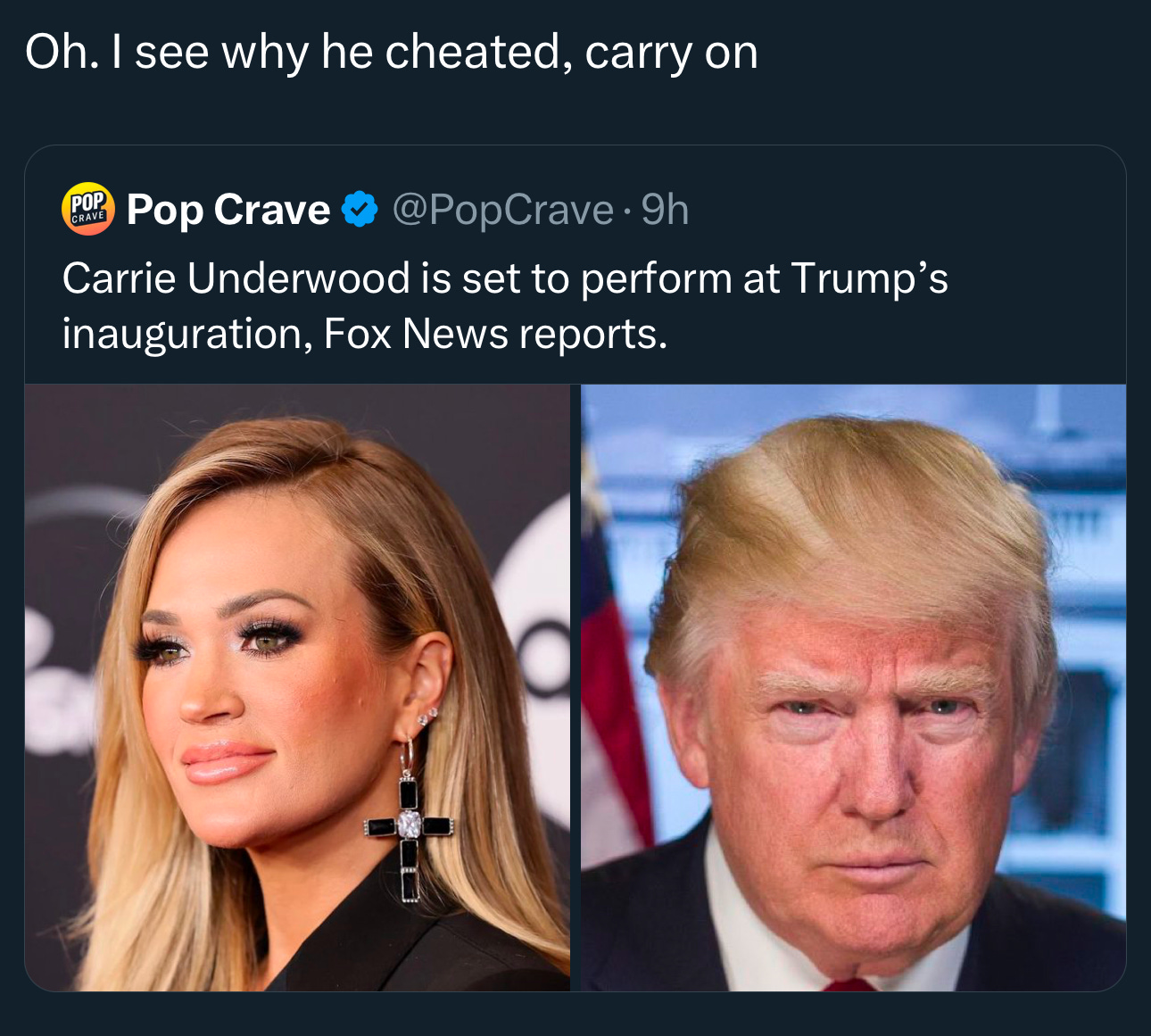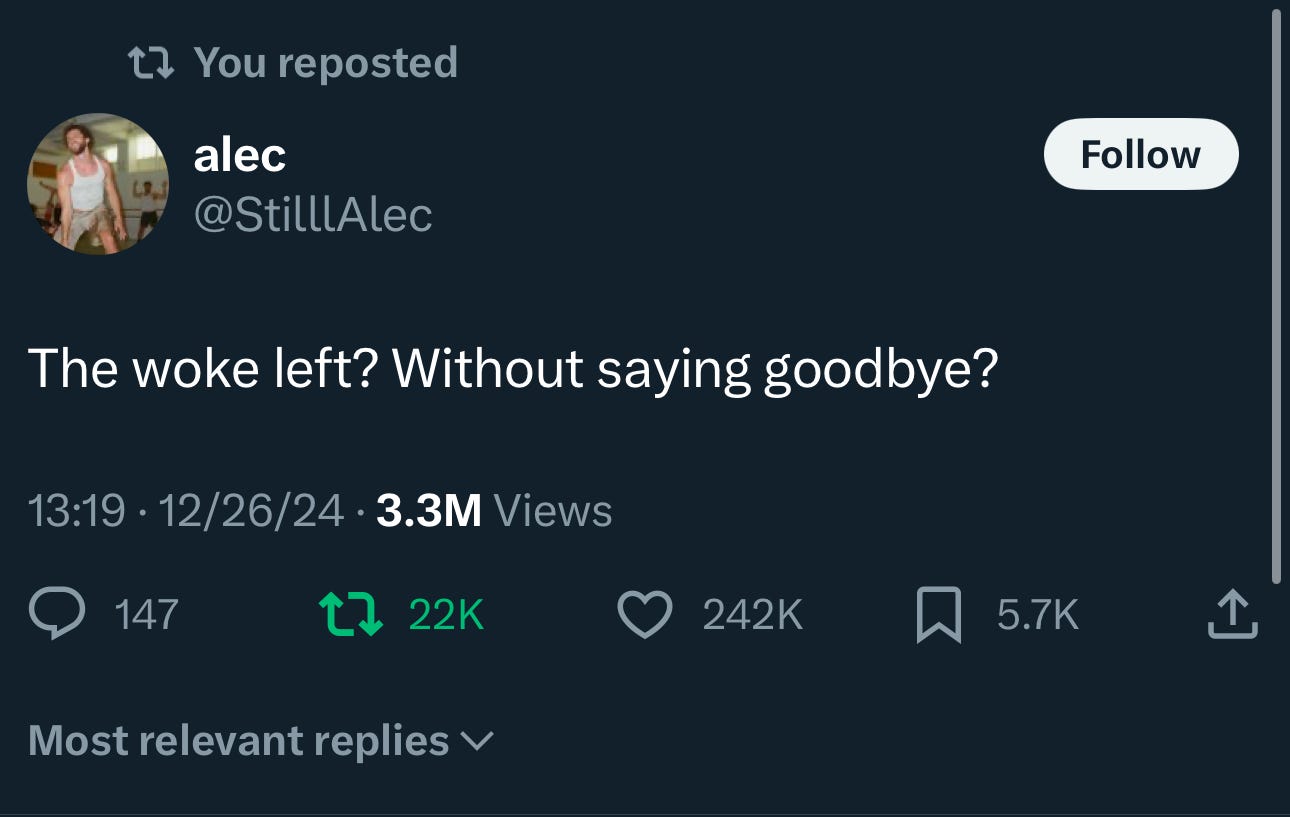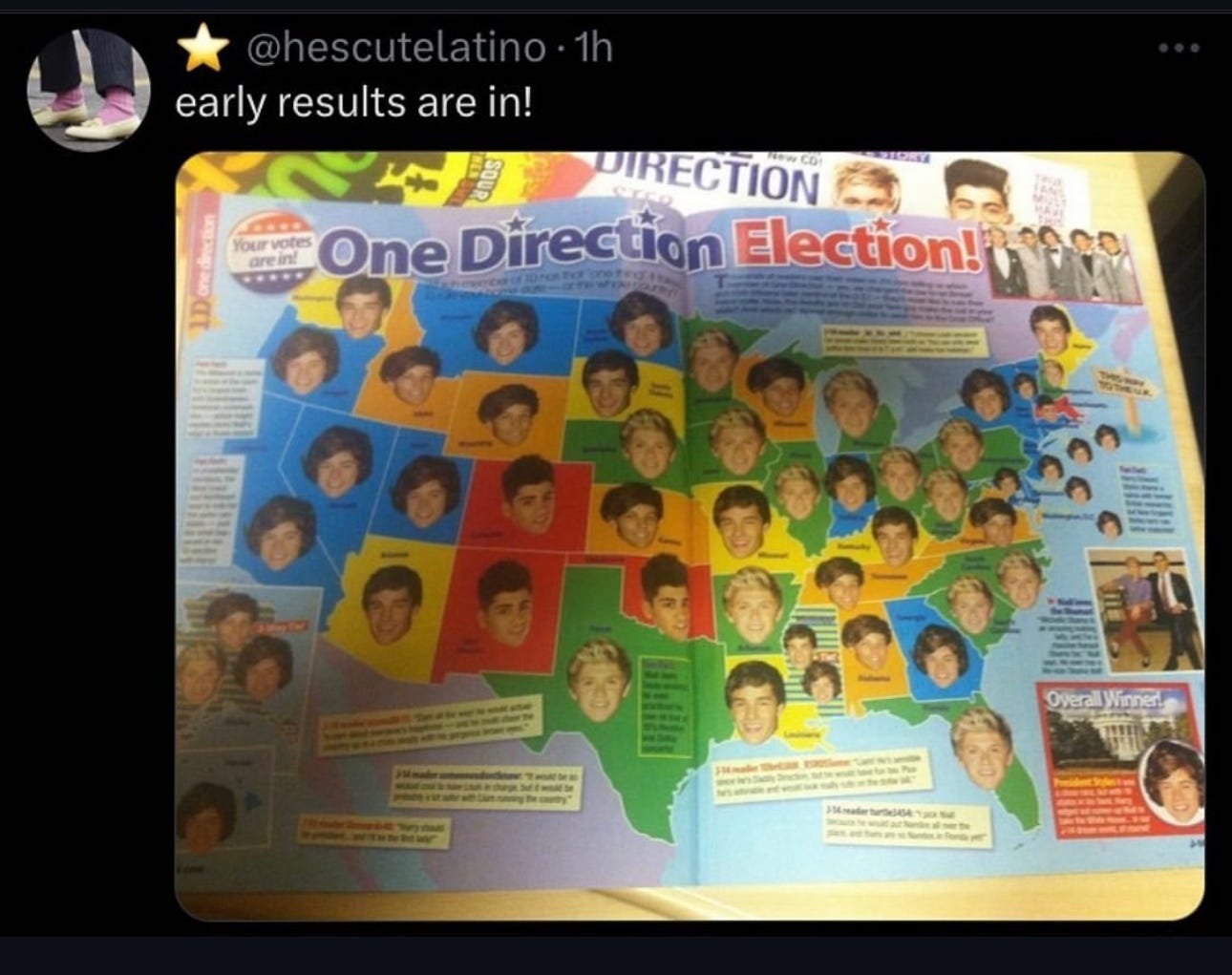AHHHHHHHHHHHHHHHHH!!!!!!!!
Gather 'round, kids—it's time to scream into the void!
Well, I’m back!
Today marks four years minus one day since I launched E4P. To celebrate, I took my longest hiatus ever with the hope of sharpening my focus, direction, and goals for where to steer this ship next.
And then this morning, I crashed out.
I didn’t realize the toll doing this kind of research can take on an anxious brain until my therapist point-blank clocked it. In fairness, I’m very good at compartmentalizing when it comes to this newsletter—every piece is a contained entity and I leave my reactions and anger and fears about the topics we cover right here when I’m done. But last night, after watching TikToks about the app getting banned, reviewing instructions on how to limit the data I provide to apps like Meta, and assembling this piece, the dam between my compartments broke.
It’s hard to watch the world burn through an app my elected officials are more unified in fighting than gun violence. It’s harder still to try to find and articulate all of the systemic failings that have led us here every week. I am not asking for your sympathy, by the way—my nerdy, nosy ass would have been reading about incarcerated teen firefighters or the oddly bipartisan support for the Laken Riley Act regardless of if anyone cared about anything I had to say.
And I think therein lies the source of my crash out: when my rage and determination and hope all dissipated, when I got offline and just sat there with myself for a second, I realized with startling clarity how insanely hard it is to be a functioning person in this world.
Some of us are weighed down by more forces of oppression than others, and some of us want to take on more oppression because it’s trending and viral. Both of these variables and more can be true. But every single one of us, at our basest level, has so much to think about, feel for, dream of, fear, grapple with, and defend ourselves against.
It is scary and hard and also stupid and weird, and while I am happy to be alive at the same time as Beyoncé and Hacks, I am also very worried about what feels like a new world order taking shape around us. My nature is to remain hopeful despite all odds, but my goal is to be honest at all costs. And honestly, right now I’m freaking the freak out.
Surprisingly, though, I think this is a good place to be to introduce today’s piece. My guest today was tasked with doing a bit of a vibe check, if you will. How do you describe being on the edge of the relative unknown with only the knowledge that you have to keep going? How do you build a future when the future is a minefield of question marks? How do you approach each day when you're always at least a little bit scared?
This week, Gill Clowes returns to do just that. Today, we talked about how her life has changed since the first Trump Administration, how she maintains relationships with those who see the world differently than her, and her hopes for the future. It’s honest and angry and thoughtful and hopeful—exactly how we ought to ring in this new year of Emily For President.
Gill Clowes is an Atlanta transplant trying her hardest to survive the harsh Georgia winters. By day, she’s a senior insurance underwriter…but by night, she’s a Reputation (TV) truther.
Although she’s now fallen into the late-20s trap of training for marathons and half-marathons, Gill redeems herself by being the best dog mom, One Direction stan, and chronically online hater she can be.
It Was the Best of Times, It Was the End of Times
While today’s intro didn’t necessarily have to do with Trump, like most situations, it doesn’t help that he’s here, too. In many ways, his re-election feels like the same kind of harbinger as his first election—with him in office, his supporters will not only feel encouraged to say their worst thoughts and beliefs out loud but that they’re entitled to them, that they’re entitled to act on them.
You all now know how I’m feeling today, so I wanted to start today’s piece by asking Gill:
Emily: How are you feeling heading into this administration?
Gill: Honestly, worse than I'd expected. I keep saying that I had libbed out through our election cycle—I was naively optimistic about our country. Now, I'm not really sure how to feel or what to expect, and as an anxious person, I hate the uncertainty. I feel like chaos is erupting around us and everyone is continuing on business as usual.
Emily: What is different about your life now than it was when Trump took office the first time? How have those differences shaped your approach to this administration, if at all?
Gill: I was in college during the first Trump Administration. I hadn't lived a lot of life, I hadn't seen a lot. I'd grown up in New York and was at the University of Delaware, President Biden's alma mater. I'd been largely sheltered from a lot of different views, yet I was still very vocal about my disdain for Trump.
Now, I'm a working professional in Atlanta, GA. I've gotten engaged (to a lovely man who shares my beliefs), but I'm merging my family with one who hold completely different views. There's a lot more pressure to keep the peace.
I don't see myself changing my approach in any way. I feel like I'm open to a conversation with anyone, but the gloves are off. No more sugar coating. We're gonna play the same game.
This whole conversation grew out of a comment Gill made when I saw her last which was that she noticed there was a difference in how she thought of people—and therefore made friends—under Trump’s first time in office compared to how she came to see people under Biden’s administration. (For reference, we met in the twilight of Trump’s first tenure.)
Given that, I asked:
Emily: You've talked about the differences in making friends under a Trump Administration versus a Biden Administration. Can you explain what you mean by that?
Gill: Throughout Trump‘s first term, I was always nervous the people I met in Georgia would be one of his supporters. Even though I was much more pessimistic then, there was always this hope that his followers would eventually see that they were wrong. These people will understand that he’s a fascist, understand that he wants to be a dictator. They’ll start to see behind his persona. After watching Biden win in 2020, it felt like we were there.
Every person that I met throughout Biden’s term had learned that lesson, and I genuinely felt like America was moving towards a better place. I felt that everybody was kind of getting on the same page on social rights. When Biden won, it just felt like America had learned its lesson. We learned that we made a mistake in 2016, we learned that it set us back and put us in a bad place. And then in 2024, I learned that people just didn’t do that.
I guess I’m trying to say that I learned that people are selfish. I learned that people don’t care about other people and that they don’t want to care about other people. On TikTok, X, Instagram, on Fox News when my in-laws watch it in my living room, it now feels like a time when we don’t have to care about other people and that we’re allowed to be selfish because our president is.
Emily: What are some other things that you find are impacted by whoever is in office that we might not necessarily label "political"?
Gill: I'm having a hard time with this question because I think everything is political now. Have you seen the girl on TikTok who can tell you what your purse says about your political beliefs? I'm almost hesitant to be quoted saying this, but I truly think we're about to go hardcore lib on all of our consumables—including with who, what, and where we spend our time.
Going into a Trump presidency, we will no longer have anything that is not political at all whatsoever. We’re going to start being way more conscious of what influencers we’re following, what TV stations we’re watching, what music we're listening to, and which artists we’re streaming—“Before He Cheats” by Carrie Underwood came off the playlist today because she’s playing at the inauguration.
If people thought "the woke left" was annoying throughout the Biden Administration, they’re in for a real surprise because we’re about to do all of that ten times over. We're going to see a big shift in social movements and boycotting—we’re already seeing people leaving Instagram and Facebook. I think we'll see further fashion archetypes linked to political parties, and beauty standards will shift.
Everything is about to be political.
As the saying goes, inside me are two wolves: one wants to say, Everything is already political, while the other wants to emphasize the rest of Gill’s point by saying, Oh, you thought I was a hater before? Baby…hold onto that little red hat of yours.
But enough about my nightly affirmations. I was interested in looking more into this idea of how relationships, at times like these, can also be politicized.
What to Expect When You’re Expecting the People Around You to Sell You to Satan for a Corn Chip
Full disclosure: this piece was not intended to be heavily researched and hyperlinked. I wanted to talk to Gill about the sentiments we shared over margaritas soon after the election and get into some of the more personal parts of life under Trump 2.0.
That said, I am me and couldn’t help myself so I did a smidge of research on the phenomenon of cutting people off over politics. According to a Time article published last month,
1 in 2 adults is estranged from a close relative. While the primary cause of these rifts is often tied to something a relative said or did, 1 in 5 directly cite political differences as the reason. Among those estranged over politics, nearly half report that the break occurred within the past year, with 1 in 7 stating it happened as recently as the month leading into the election. These disconnections often involve severing all communication, including through intermediaries, and blocking the relative on social media.
There seems to be almost exclusively anecdotal data on this topic, with many articles sharing the same core sentiment: people on both sides of the American partisan spectrum are just as likely to cut one another off when they differ on personal politics. CBS News interviewed clinical and forensic neuropsychologist Dr. Judy Ho who stated that
some research shows that when people encounter statements that contradict their deeply held beliefs, their brains react similarly to facing a physical threat.
“It puts them into a fight or flight stance, and that makes conversation impossible, because when you're in fight or flight, you're not going to have any kind of productive conversation…”
That's why we tend to see disagreements that lead to unfriending someone occur more often around social views, and less around something like economic policy, said Dr. Laura Vogel, psychologist and director of mental health services at Momentous Institute (X).
In my research, I found my way onto the r/AskALiberal subreddit where two months ago, a conservative poster who had been cut off by his best friend of 30 years asked, “If you have cut someone off, do you stand by that decision? How is it a remotely helpful thing to do for either you or the other person? I just cannot wrap my head around why ending a lifelong relationship is the best choice in this situation.”
The post received over 579 responses, with some of the top ones echoing Dr. Ho and Dr. Vogel’s statements:
u/ecchi83: “Yes I have cut people out of my life because of their stance in politics because ultimately it comes down to I don't want to associate with anyone who thinks some human beings as inherently worth less than other human beings.”
u/Jimithyashford: “Not everything is about gain. Some thing are about minimizing damage or pain. There are lots and lots of things about a person that can make the relationship with them cause too much pain to be worth what you get out of it…it usually about limiting or stopping harm/loss/emotional turmoil.”
u/Blackbird6: “I started distancing myself from certain people during his first presidency, actually, so my interaction with Trump supporters was pretty limited the second time around…but yes, I have cut people off over it. I stand by it 100%.
It’s not about politics. It’s about values. In order to vote for Trump, one of three things have to be true.
(1) You are completely unaware of his actual bigotry. (2) You are aware of his bigotry and may not endorse it, but it wasn’t a deal-breaker for you. (3) You are aware of his bigotry and agree with it.”
Here, I can’t help but include one of my favorite videos on the Internet:
Cutting out people based on political differences is feasible for some of us. A survey from The Harris Poll cited in the above Time article found that the majority of those with severed connections “tend to look for ways to limit their interactions with their estranged relation rather than force themselves or the other person to isolate from shared connections.”
For others, it is not practical or even possible to just stop talking to people because of how they voted. They can be people we live or work with, people we rely on in our everyday lives. It can be hard—at least it has been for me—to not echo the subreddit liberals whenever I interact with those who I know voted for Trump. I want them to know that it feels like they voted against me.
Gill is someone who has to deal with dynamics like this far more regularly than I do, so I wanted to know:
Emily: You have close relationships with Trump voters and supporters. How have you previously navigated that and do you envision your dynamics changing at all now?
Gill: It's hard. In the past, I've really wanted to educate. Like I've thought that there's been room for redemption. We were all infographic queens thinking that our IG stories were going to change anyone's mind.
If you couldn't tell, I'm feeling way more cynical and honestly frustrated with myself. Why do I want to keep trying to help them? Why do I go high when they go low? In line with my earlier comments, I now think my time is political. Who am I spending time with? How am I spending that time?
I'm no longer spending the time that I have in a day to bicker about rights to my body with the Brads, Chads, and Dads.
Emily: How do you manage living, working, communicating, etc. with people who support Trump and what he believes?
Gill: I don't have a good answer for this. I don't know, and sometimes I'm stuck. In a corporate, office role, in Alpharetta, GA—it's really hard to just not interact with Trump supporters. It's also really hard to not give the time to my in-laws, whom I reside with currently. I have to take everything with a grain of salt, and I also kind of have to keep a mental roster of who's safe, and who's not.
One of the things I’ve been grappling with today has been the feeling that the abstract is suddenly too real. Project 2025 was scary when I started looking into it in November 2023, but it made me feel genuinely insane to think of it as a legitimate governing blueprint effective next week. I finally allowed myself to wonder what the day-to-day was going to look like living under a government staffed by people who hate my friends and me—a phrase I also allowed myself to say without feeling hyperbolic.
I started to recognize that I’ve been doing this weird dance of managing to think about the potential individual effects of this administration’s agenda on a national scale. By that, I mean that even when I was talking or thinking of, say, the total loss of my bodily autonomy, my brain kept me from seeing a reality in which these measures play out in my life. Why? Because if the worst of it all could remain a threat to us all—grandly, collectively—I could gather more courage to fight back. If it got too close to home, well…I’d end up writing pieces that all sound like the terrified introduction I wrote today.
But it is all close to home. The Trump 2.0 Agenda is already as personal as it is national. Recognizing this, I asked Gill to do what I had been too scared to:
Emily: How do you think this administration is going to impact you personally, and how are you preparing for that?
Gill: Personally, I'm fearful for women's rights. I'm fearful of being in the part of my life where I'm getting married and I want to start a family but what will that mean for me in these next four years? I don't really know a better way to be prepared other than just having open conversations about my feelings with my fiance, but I'm holding space for it in my head.
Emily: Has Trump’s election changed how you think about and plan for the future? If so, how?
Gill: Not to lean into the whole biological clock thing, but I'm at the age where I'm treating my dog as though I personally birthed her...so it's safe to say the maternal instincts are kicking in.
I want to be a mother and start a family, and I've always hated when people would say, “It would be irresponsible to bring a child into this world,” but I'm starting to get it. I don't know if it will be the right call or the safe call to move forward with that process if I could be putting myself and a potential child at risk. It's sad and it's scary.
I’m having a hard time reconciling the start of this section with where we ended up, especially after reading Gill’s responses. I keep returning back to the conservative’s post in the subreddit. He is so confident both in his own opinions and his intentions to not sway his estranged friend to the right. Yet, the responses clock something he doesn’t in his narrative: he seems entitled to his desire for his life to be how he wants it, with his friend in it, without any regard for how his beliefs may be impacting his friend.
After years of studying conservatives and conservative content, of trying in vain to understand how we got to a second Trump Administration and why, I have somehow come back to the same question that no one seems to be able to answer: how can those on the right claim to care so much about America, about children, about women, and so on…but only if they exist on very specific terms? How can you say you care when your care is conditional?
As soon as I typed that, my brain immediately went into critical thinking mode—Is my care conditional?—and I started to write something that would temper My Big Feelings. But today, I don’t really want to. If you’re uncomfortable with all of this, well, join the club.
Hope is a Dangerous Thing for a Woman Like Me to Have, But I Have It
As honest as I’ve been today about my fears, I can’t say I’m entirely without hope for our future. Am I childish for believing in good people? Am I wrong for liking America just enough to try to save it? Am I a MAGA sleeper agent who has no idea why she has hope and a hankering for raw milk?
I don’t know!!! I don’t know why I care and want and hope for more, for better, for good.1 All I know is that I couldn’t stop myself from asking Gill:
Emily: Where do you hope you will be in November 2028, and where do you hope the country will be by then?
Gill: In November 2028, I hope we'll be in one piece. I hope we'll have an election. I hope we'll have two viable options for president that maybe we haven't heard of a million times already. I hope that we'll not be in too much of a different place than we are today and that Trump isn't able to pull off his nonsense and his deeply problematic promises. I hope that we're not in the midst of a civil war. I hope that Elon Musk has been deported. I hope that Dr. Pepper isn't outlawed or edited in any way from its current formula. I hope that our generation doesn't have to live through another major historical event.
Emily: How realistic are your hopes?
Gill: Realistic? I genuinely cannot possibly see how this is going to go. I'm scared.
Emily: Who do you want to be under this administration and who do you want to be if/when it’s all over?
Gill: Under this administration, I want to maintain my sense of self. I want to continue to have my job, my savings, and all of that. I want to maintain my right to choose. And I want to know that if I decide to have a family, we'll all be safe. I want to continue to be vocal about my beliefs, and my sense of right and wrong. I want to keep my sense of individualism.
The critical part of my brain wants to tie this to the end of the last section, to compare fears for safety and autonomy with those of trans kids getting medical care and immigrants ruining plans for a white supremacist nation. But I have four years to make my points.
For now, I wanted to close by asking Gill two final questions:
Emily: What is your greatest fear about living under this administration?
Gill: I can't pick one. I'm afraid of all of it. How are we going to survive it again? We are all at each other's throats, and the division is only going to get worse. I'm so anxious about what could possibly happen.
Emily: What is your greatest hope about living under this administration?
Gill: I hope that this will be a period of enlightening for some. I want to believe that people can see that harm is being caused. I want people to feel regret for their decision to bring back this administration.
I hope that we're largely unscathed, but I hope that if you voted for Trump you get EXACTLY what you voted for.
As Representative Jasmine Crockett (D-TX) put it, “We are in the ‘find out’ phase.” You know…because Trump supporters fucked around?
I have a lot to thank Gill for—my job, her friendship, insane Taylor Swift conspiracy theories—but I am so grateful she wanted to do this piece with me today!!! A million thank you’s to her, and approximately a hundred thousand thank you’s to Glossier for bringing us together!!!
Not sponsored by the Wicked franchise.








